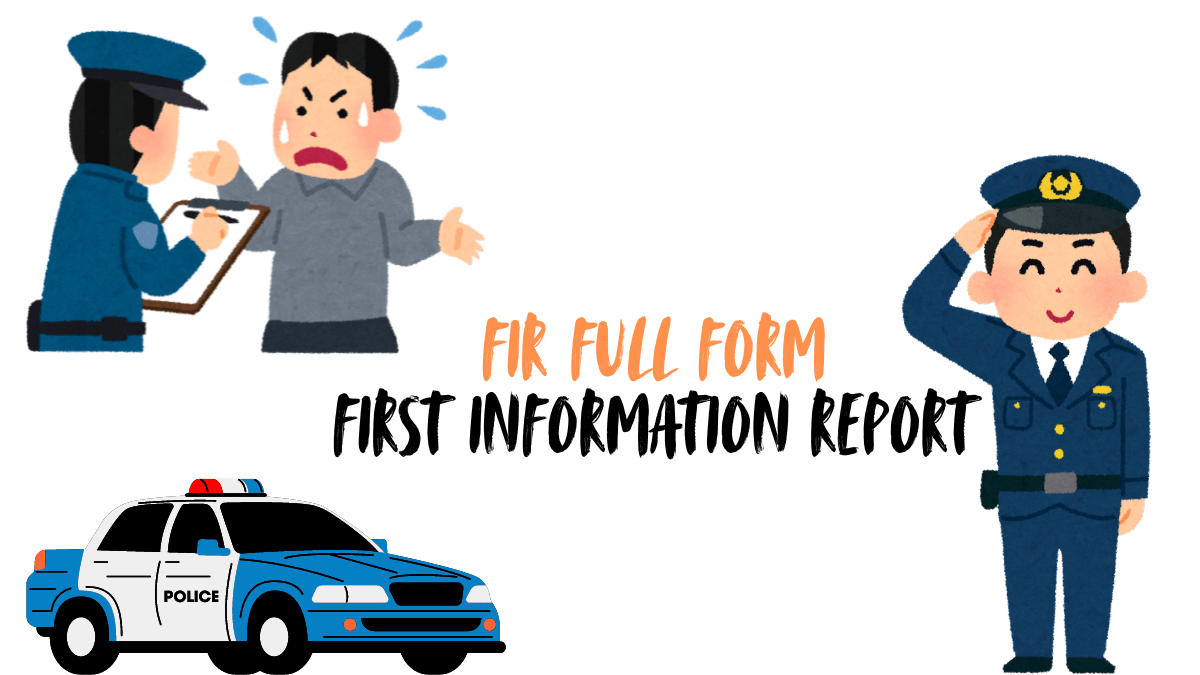Everyone of you must have heard about FIR. If you possess a basic GK, then you must know that FIR is related to complaint filed in the police station. You must have seen the FIR registration scene in the police station in several movies and serials. Have you ever wondered what is the full form of FIR? In this article, we will know about the FIR full form in detail and know how to file an FIR.
FIR Full Form
The FIR full form is first information report. A first information report is a document prepared by generally Police to start an investigation in India and other countries. When the police in these South Asian or Southeast Asian countries obtain information concerning the commission of a cognizable offence, they file a formal complaint. Read the full article to learn more about FIR, how a first information report is created, procedure and other information.
What is the Full Form of FIR?
The most general full form that comes to mind by FIR is the First Information Report, that a person files in police station. An FIR is filed in some countries when the police obtain information concerning a criminal offence. It usually begins with a police complaint filed by a victim of a cognizable offence.
An FIR might be filed by a third party on behalf of the victim. An entry is made in a community service record or the station journal for a non-cognizable offence. Each FIR is significant because it initiates the criminal justice process.
What is FIR?
In a cognizable offence, a police officer can arrest any accused without a warrant. The police can also initiate an investigation with or without court permission. A police officer, on the other hand, does not have the jurisdiction to conduct an arrest without a warrant, and an investigation cannot begin without a court order in the case of a non-cognizable offence.
Only cognizable offences are eligible for a police report. Cases that can be recognixed are more serious than those that cannot. Serious offences are usually classified as cognizable and incur a penalty of three years or more.
Who Can File an FIR?
The police do not begin investigating most types of cases until the FIR has been filed at the police station. An FIR can be filed by anyone who has information concerning the commission of a cognizable offence, including police officials. Furthermore, anyone can file a report to the police, either orally or in writing, thus knowing about cognizable offences is essential.
Elements of FIR
FIRs are the first stage for an investigation into a specific offence. The written FIR has some specific elements in it, those are –
- FIR file name.
- Name of the victim
- the person filing the complaint.
- Offense description
- Time and location of crime
- Witness Statements (If Any Witness available)
- If the culprits have been identified, provide the person’s name and information about them.
How to Register First Information Report?
Section 154 of the Act Code of Criminal Procedure, 1973, lays out the procedure for filing an FIR, as follows:
- When information about a cognizable commission offence is given orally, officers must write it down.
- It is your right as a person who provides information or file a complaint to have the details of the police report read to you.
- The individual who supplies the information must sign the data when it is recorded by the police.
- You should sign the report only after you’ve double-checked the contents and confirmed that the police record matches the information you gave.
- People who are unable to read or write must make an impression on the paper with their left thumb until they are certain it is a genuine record.
- If the police refuse to give you a copy of the FIR, demand one. It is your right to receive it without any fees attached.
Importance of FIR
After knowing the FIR full form, you should also know the importance of FIR.
- Only with a valid FIR police can do an investigation in the case of any mishap.
- FIRs play an important role in starting an investigation and in the overall justice system in a country.
- If a first information report is registered, the FIR content cannot be changed except by a Supreme Court or high court order.
| Related Full Form You Must Know | |
| IG Full Form | SSC Full Form |
| OTT Full Form | ICSE Full Form |
| INR Full Form | ED Full Form |










 CGPA Full Form, Meaning in Hindi, Kannad...
CGPA Full Form, Meaning in Hindi, Kannad...
 TGT Full Form, Check What is the Full Fo...
TGT Full Form, Check What is the Full Fo...
 CCTV Full Form- Check Uses of CCTV
CCTV Full Form- Check Uses of CCTV









